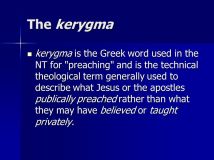Many of us are discussing the school tragedy in Parkland Florida. After this is the kind of event, I frequently hear, “This is why I don‘t go to church. This is why I don’t believe in God. There is no way a ‘good’ God would let something like this happen.” At times like this, it’s good to go back to the foundational elements of our faith. It might not make us “feel” better. It might even anger some. It’s necessary that we understand who God is, how God acts, who we are and our relationship to God and who we are in our relationship to others. It also provides us with hope and a challenge to bring that hopeful light into dark places and events.
Bishop Daniel Mueggenborg is an auxiliary bishop of the Archdiocese of Seattle. He provides us a summary of the “Amazing Story” or the “original proclamation,” of the Catholic Church, which is also known as the “kerygma.”

God created the world as good. God intended humanity to live with him in a communion of peace and love. At some point, this original state of grace was lost through a free choice of disobedience on the part of humanity. The results of this decision – freely chosen - is catastrophic:
- We lost the blessing of original perfection. Happiness and peace are gone. We now stand guilty as sinners.
- We lost our original innocence and human sexuality is corrupted.
- Our communion with God is broken. We enter into a state of alienation and disharmony.
- The environment is cursed.
- Death becomes part of the human experience. It starts with Cain killing Abel. It grows to almost all humanity being destroyed in the flood. This slams through to the present day - in Parkland, in Sandy Hook, in Columbine and the Twin Towers in New York. God does not pull gun triggers so God is not the “reason” for the killing.” God “could” stop the killing, but chooses not to make us slaves and robots. He gives us free will and free choice. The consequence is that humans can freely choose to love or hate, to support life or take it.
- Humanity becomes arrogant towards God is seen in the Tower of Babel. We see the result of this fallen state as the continued increase of evil.
Humanity is not able to rescue itself from the clutches of The Fall, the effects of sin in our lives, and the forces of evil pitted against humanity. The darkness of sin obscured God’s original plan for our lives – but it did not destroy it!
Then, the story takes a turn. In the fullness of time, God sent his only Son, Jesus Christ, to “go down the checklist” listed above. Jesus rescues us from the forces of evil, the experience of death, and the effects of sin in our lives. Jesus, as a sinless person, possessing fallen human nature, restored our right relationship with God the Father and paid the price of humanity’s sinfulness by dying. Jesus’ sinless humanity, breaks the bonds of death and enters with his humanity intact, into heaven. Thus, through his resurrection and ascension, Jesus opened the gates of heaven to all other human beings.
Jesus reigns eternally as Lord of heaven and earth with the Father and the Holy Spirit. Jesus Christ then sent his Holy Spirit into the hearts of anyone who chooses to receive it. In this way, we can be formed as his mystical body in the communion of the church. In the church, he continues to speak his word to us and to feed us with his very self (body and blood) in the Eucharist.
Thus we see the reason for St. Paul’s statement in today’s Second Reading:
Brothers and sisters: If God is for us, who can be against us? He who did not spare his own Son but handed him over for us all, how will he not also give us everything else along with him?
Who will bring a charge against God’s chosen ones? It is God who acquits us, who will condemn? Christ Jesus it is who died—or, rather, was raised— who also is at the right hand of God, who indeed intercedes for us.
The forces of sin and death no longer have the last word for those who accept and respond to God’s plan of salvation through Christ. Christians who share fully in the life of grace are drawn deeply into an eternal communion of life and love with the Father, through the Son, and in the Holy Spirit.
There are enormous implications in this for our lives. Living as “Children of God” means accepting and living a new, moral live. Accepting and responding to the “Lordship of Jesus” means that we seek and follow God’s guidance in every decision. Living “in the communion of the Holy Spirit as the body of Christ” means that we are active members of the church. We celebrate our Lord in word and sacrament. We also become his presence in the world as missionary disciples. We bring light into dark places, spreading this story to others and encouraging them to follow Christ and God’s plan.
In the midst of incredible darkness. God provides what is needed to move men and women further along. We are also part of that plan. God does not provide a car to get to heaven and not fill the tank with gas. Filled with the Holy Spirit, we become the gas that helps drive the car - bringing others away from darkness, towards the light and further down the journey toward new hope in Christ.
An audio version of the homily is here: